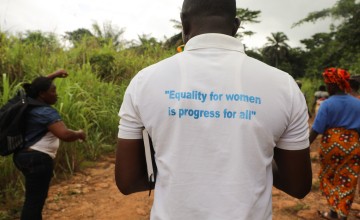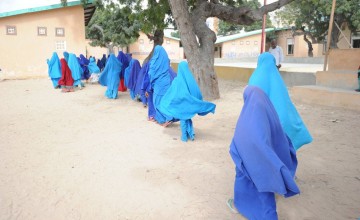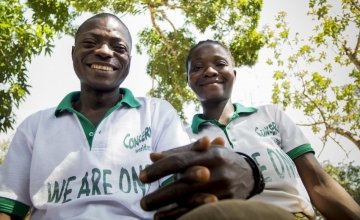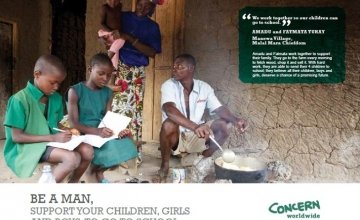
Read our 2023 annual report

Knowledge Hub
What is the ‘16 Days of Activism Against Gender Based Violence’?

One in three women experience physical or sexual violence in their lifetime, most frequently by their partner. There is no country in this world where women are free from this fear and terror. The ‘16 Days of Activism Against Gender Based Violence’ is a campaign that seeks to bring this violence to an end.
Most dangerous place for a woman is at home
In Ireland, one in five women experience domestic violence during their lifetime, and it is estimated that 213,000 women in Ireland are living with severe abuse from their boyfriends, husbands and partners. In many of the countries that Concern works in, the rates are much higher. Some national studies show that up to 70% of women have experienced physical and/or sexual violence from an intimate partner in their lifetime.
Violence against women is pervasive yet an under-recognised human rights violation. Around the world, at least one in three women have been beaten, coerced into sex or abused in some way, most often by someone she knows including her husband or another male family member.
Schools are dangerous for girls

How would you feel if your sister or daughter eager to go to school to fulfil their ambition to be a doctor or a teacher had her hopes and dreams torn to pieces because she was sexually assaulted in school, the place where dreams should be nurtured and developed, not shattered and broken? This scenario is sadly not uncommon as studies in a number of countries have found that some girls are coerced into sexual acts by teachers who threaten them with poor grades if they do not cooperate.
A study that Concern carried out in Malawi showed that 59% of girls reported some form of severe punishment by a teacher and 42% of girls experienced an incident of sexual violence in the preceding 12 months. The range of reported School Related Gender Based Violence (SRGBV) cut across sexual, physical and psychological. Not surprising then that many parents keep their daughters at home, depriving them of an education, because of the fear of violence that may take place either in school or on their way to school. UNICEF estimated that 120 million girls have been raped or suffered other forms of sexual violence at some point in their lives.
Linking human rights to ending Gender Based Violence
The 16 Days of Activism Against Gender Based Violence (GBV) is an annual global campaign that runs from 25 November to the 10 December. The campaign challenges the systems that perpetuate GBV and creates awareness about how to overcome it. 25 November marks the UN Day Opposing Violence against Women and 10 December marks Human Rights Day. The campaign spans these 16 Days in order to highlight the link between violence against women and human rights. Today, women and girls are subjected to many forms of human rights violations solely on the basis of their gender.
What exactly is Gender Based Violence and what does it include?
Gender Based Violence against women takes many forms and can be physical, sexual, economic and psychological. The nature and extent of the violence can vary across cultures, countries and regions and take place at the family, community or state levels. It includes everything from female genital mutilation (FGM) and dowry deaths to acid throwing and honour killings. Some forms of violence however, like domestic violence and rape, are prevalent worldwide.
For millions of women and girls living in poverty, experiencing violence is their reality. As they struggle to survive, they are often are forced into having sex for money in order to pay for food or school fees. This increases their vulnerability to transmission of HIV and AIDS and other health problems as well as psychological and physical damage.
Violence can be prevented

However, the positive side of a very dark cloud is that this violence can be prevented. But it is essential that we all stand up and break the silence on violence against women and girls. This campaign offers us all the opportunity to do just that. Concern organises events in our country offices and in the communities that we work with in order to highlight the issue of violence against women and girls. By doing so, we make the issue visible, we give hope to women and girls who are suffering and we hold perpetrators of abuse to account.
Violence against women is intrinsically linked to unequal power relations between men and women. This leads to domination over and discrimination against women and girls by men and boys. Deeply entrenched attitudes of gender norms and distorted traditional gender stereotypes continue to fuel the levels of violence. If we are really going to tackle the reality of violence against women and girls, we have to involve men and boys.
We are involving men and boys and it’s working
Concern’s experience informs us that we cannot address poverty without addressing the underlying causes of gender inequality and violence against women. We are seeing positive shifts in behaviour by engaging with everyone, women and men! By creating the space for facilitated discussions which explore issues of gender stereotypes, harmful norms and violence, we have seen a reduction in conflicts in the home, better sharing of workloads and increased decision-making power for women.
We work with women’s self-help groups, focusing on their economic empowerment, so that they can increase access to resources and decision-making power in the household. This in turn has improved their self-esteem and their status in the household. We ensure that the men of the household are engaged with the project through facilitated family days. Here, more strategic issues of gender inequality can be addressed with the whole family involved. The results have been dramatic in terms of changing household dynamics and in many cases, have led to the elimination of domestic violence.
Mothers and fathers involved in these projects also commit to not practicing certain harmful traditional practices, such as FGM, on their daughters. This represents a huge change in cultural practice.

We must continue to support women to end this horrific reality
To have achieved such a change for these women is significant and proof that we must continue to stand up and support women around the globe in the quest to stop Gender Based Violence. The importance of engaging with men on issues of violence and gender equality is very clear. By working on and reshaping gender norms with men and women there is real hope that long-lasting positive changes can be achieved for women and girls. Men have the power to make the changes so it’s critical that we engage with them and open their eyes to the benefits of positive forms of masculinities to their families, their partners and children but also to themselves.
However, it is also essential that a commitment to ending violence against women and girls exists across all levels from national governments, down to community institutions and families. Family is the starting point of the socialisation process for girls and this is where real changes can take place that will transform the reality for everyone. Women and girls need to be empowered to stand up and report against violence, and for this to happen a supportive and enabling environment must exist for action to be taken and changes to take place.
Concern, with the support of the Irish public and government, will continue to tackle issues of violence against women and girls in the countries in which we operate. Whether it is school related violence or violence at household, community or state level we will continue to work with women and men, girls and boys, to end this horrific reality.
Follow our work with women and men around the world
Follow us on Instagram to meet the people who we are working with in 24 of the world’s poorest countries.


